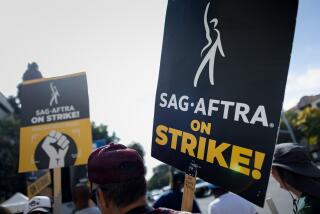Baseball Owners, Players Have Late Session of Talks
- Share via
Negotiators for the baseball owners and players, attempting to preserve the April 2 start of the regular season, were still locked in a collective bargaining session in New York at 1:30 EST this morning.
Commissioner Fay Vincent, who returned to his Manhattan office when the talks resumed there at 9:50 Friday night, delayed an expected announcement that some regular-season games will be canceled or postponed as the Major League Players Assn. weighed what the owners’ Player Relations Committee described as a deal-making proposal and the most generous in baseball history.
The proposal calls for improvements in the owners’ previous pension and miminum salary offers, loosens restrictions governing repeat free agents and roster recalls but does not address the pivotal issue of arbitration eligibility.
The requirement would remain at three years under the proposal. The union has indicated there will be no deal unless eligibility is rolled back to two years, as it was before the 1985 agreement.
The proposal, if agreed to over the weekend, is also thought to call for a 162-game schedule that would maintain the April 2 start. As compensation for a two-week training camp, teams would be allowed to carry 30 players for the first month, then 25 after that, an increase from 24 that the union has been seeking.
The proposal was delivered to the union’s New York office in mid-afternoon Friday, Day 30 of the owners’ lockout.
It was studied by union officials and about 10 players for almost four hours, a period enlivened by Marvin Miller, the union’s former executive director, who dropped in to deliver a pep talk on unity.
The group then broke for dinner, held a brief news conference and then went to Vincent’s Park Avenue office for the 32nd negotiating session and first in 10 days.
In the news conference, Don Fehr, the union’s executive director, would not discuss specific terms of the proposal but said, “It does represent movement in certain areas and to that extent it’s constructive, but there are some areas that weren’t addressed in a meaningful fashion and they need to be discussed.
“But unlike the clubs’ tendency,” Fehr said, “we will discuss it with them before we discuss it with you.”
Fehr had been angered Thursday by O’Connor’s public statements, painting the proposal as a “deal maker,” allowing parts of it to leak to the media and saying he had scheduled a Friday afternoon meeting with Fehr to present it.
Fehr responded Thursday by saying no meeting had been scheduled and called it another public-relations charade designed to put pressure on the players.
His tone Friday night, however, was conciliatory, a reflection, perhaps, of what is thought to be growing sentiment among the players that the fight over arbitration eligibility should end now that the regular season is threatened and the rewards in other areas have been improved.
Fehr is scheduled to meet with the 26 player representatives in New York today, at which time they may vote on the proposal.
Tim Belcher, the Dodgers’ player representative, said of a proposal that did not include an arbitration rollback: “I’d shoot it down in a minute, but I’m a hard-liner. I don’t know how the rest of the team would feel about the total package until I see it.”
Most observers believe that unless a settlement is reached this weekend, the impasse could wipe out a significant portion of the first half, with none of the canceled games being made up.
Aside from the provisions dealing with salary arbitration and the opening of the season, these are the key aspects of the new proposal:
--Raises the minimum salary, $68,000 in 1989, to $100,000, which is $5,000 below the players’ last proposal.
--Provides an average annual contribution of $55 million to the pension and benefits program, which is $2 million below the players’ last proposal and about $14 million more than the owners’ 1989 contribution.
--Eliminates free-agent repeater restrictions, meaning any player who signs a free-agent contract can become a free agent again when that contract expires instead of having to wait five years.
--Lessens free-agent compensation rules and tightens restrictions to make it more difficult to remove players from the 40-man roster.
--Provides a definite timetable for expansion to 32 teams (16 in each league) by the end of the decade, meaning six new teams and 150 player openings.
The proposal also includes two key items previously agreed to: a guarantee by the owners of treble damages if found guilty of collusion again, and a joint study commission on revenue sharing with each side having the right to reopen negotiations on economic issues after three years of a four-year agreement.
More to Read
Go beyond the scoreboard
Get the latest on L.A.'s teams in the daily Sports Report newsletter.
You may occasionally receive promotional content from the Los Angeles Times.










